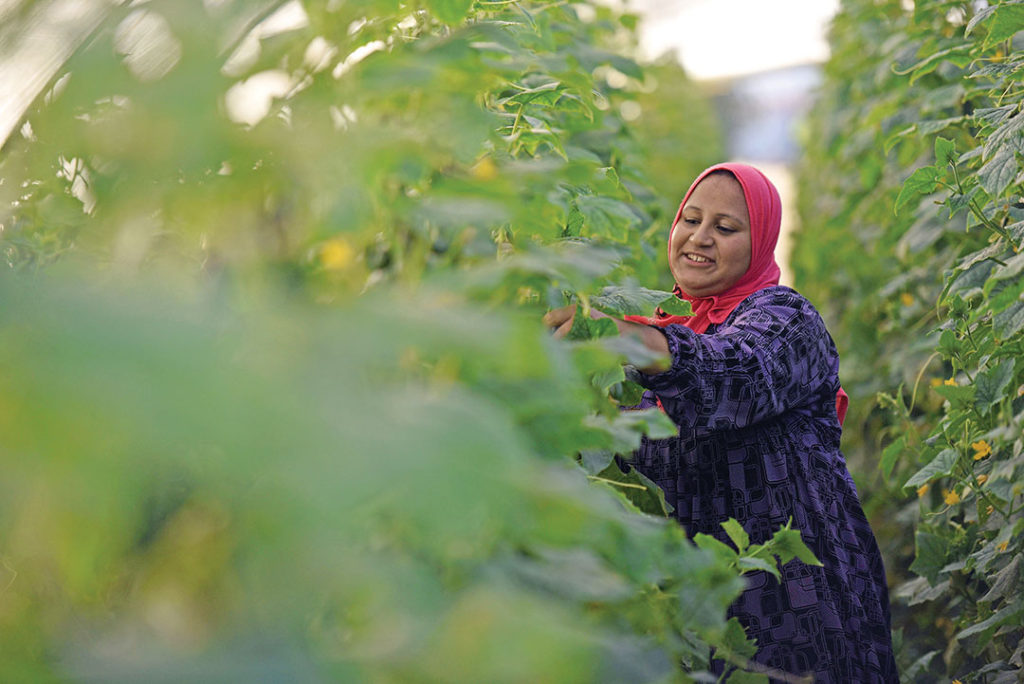A military-supported greenhouse project will supply millions of tons of vegetables to ease potential food shortages
EGYPTIAN MINISTRY OF DEFENSE/MORALE AFFAIRS DEPARTMENT
Egypt has launched a nationwide strategic plan to improve food security, starting construction on 100,000 acres of greenhouses that will save water and optimize land usage in the mostly arid country.
Egypt’s military is not only playing a role in building the greenhouses, but is also contributing 4,900 acres for the project near Mohamed Naguib Military Base, where 1,300 climate-controlled greenhouses will grow vegetables and other crops strategically important for Egypt.
Ceremonies to launch the project occurred in Hammam City near Mohamad Naguib, where Egyptian President Abdel-Fattah el-Sissi listened to a presentation by Dr. Abdul Muneim El-Banna, then minister of agriculture and land reclamation, and Gen. Mustafa Amin, general director of the National Service Projects Organization. Gen. Mustafa’s organization will conduct the project under a subsidiary called the National Company for Protected Agriculture.
The first phase of the project will encompass 5,000 greenhouses on 20,000 acres near Hammam, Abu Sultan, 10th of Ramadan and Amal Village in the Sinai, east of Ismailia. The goal is to ration water usage, satisfy the demands of Egypt’s consumers, increase exports and maximize return on investment by applying modern scientific methods to growing crops.
Using ordinary greenhouses for some forms of agriculture saves 50 percent of water compared with open-air agriculture, with a threefold increase in yield. High-tech greenhouses achieve even greater savings, requiring 90 percent less irrigation and generating a sixfold increase in yield on the same amount of land.
Phase one expects to achieve a yield of 1.57 million tons annually of various vegetables on the 20,000 acres, a yield that would require 100,000 acres if open-air agriculture were used. This phase will also create approximately 40,000 direct jobs. Gen. Mustafa indicated that National Service companies have built 86 of the greenhouses near Mohamed Naguib while other companies built 14 percent under the supervision of the Armed Forces Engineering Corps.
Gen. Mohamad Abdel-Hai, board chairman of the National Company for Protected Agriculture, said the project would reduce the nation’s food deficit, reduce prices and produce crops free of harmful chemicals.
“The guidance of the political leadership has been to reduce the food gap in the Arab Republic of Egypt,” Gen. Mohamad said.
To achieve added value, Egypt plans to build a packing and sorting plant near Mohammed Naguib in 2018 with a daily capacity of 1,200 tons and also build an organic fertilizer factory that would use compost generated by the packing plant.
A group of nurseries has been set up to provide seedlings that are inoculated to resist soil-borne diseases. These are among the best techniques to increase productivity and reduce costs. Inoculation is the optimal alternative to chemical soil sterilization compounds and helps to improve crop quality. Thirty-two nurseries would serve phase one, with each capable of producing 20 million seedlings per planting period, while a single nursery can have six planting periods per year.
To reap even more benefits from the greenhouse project, feasibility studies are underway for construction of a modern vegetable and fruit dehydration plant in cooperation with the Italian company Tecnoclima.
Gen. Hassan Abdel Shafi, director of the Military Engineers Department, discussed the value of placing greenhouses near Mohamed Naguib. Technical studies revealed that soil quality, climate and available water made the location suitable for intensive agriculture.
Furthermore, the site is well connected by road and rail to nearby population centers such as Alexandria and exporting hubs such as the Port of Alexandria and Borg El Arab and El Alamein airports. Newly laid pipelines will provide irrigation water for the greenhouses from pump stations and reservoirs.
In addition to the work near Mohamed Naguib, President el-Sissi inaugurated work on greenhouses in Amal Village east of the Suez Canal and at the 10th of Ramadan and Abu Sultan sites. An overview of the project — a film called Green Egypt — was released by the Morale Affairs Department.

